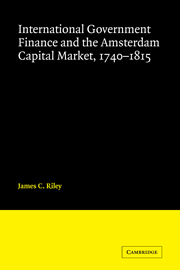Book contents
- Frontmatter
- Contents
- List of tables and charts
- Acknowledgments
- 1 Introduction
- 2 The Amsterdam capital market
- 3 Public credit in the Dutch Republic
- 4 Supply and demand patterns
- 5 International government finance
- 6 The debtor states: I
- 7 The debtor states: II
- 8 The collapse of solvency
- 9 Economic consequences of lending to foreign governments
- Abbreviations
- Notes
- List of sources and works cited
- Index
8 - The collapse of solvency
Published online by Cambridge University Press: 04 August 2010
- Frontmatter
- Contents
- List of tables and charts
- Acknowledgments
- 1 Introduction
- 2 The Amsterdam capital market
- 3 Public credit in the Dutch Republic
- 4 Supply and demand patterns
- 5 International government finance
- 6 The debtor states: I
- 7 The debtor states: II
- 8 The collapse of solvency
- 9 Economic consequences of lending to foreign governments
- Abbreviations
- Notes
- List of sources and works cited
- Index
Summary
Contraction in Amsterdam
The visible decline of the Amsterdam capital market began in 1793 when the expansion of the War of the First Coalition to include the Dutch Republic and the approach of French troops led to what was viewed at the time as a temporary languor in capital supply. As that image suggests, the market was prepared to withstand a short conflict whose consequences for international finance were roughly proportional to the effects of remembered wars. But the war that began in 1792 was not of brief duration and its financial consequences stood in no relation to prior experience.
Because Dutch governments heightened their borrowing, even unrestrained willingness on the part of investors to take up loans would not have permitted continued market expansion. Debt accumulation by domestic government and the annual addition to the outstanding total of foreign government loans together may be estimated at some f. 30 million per annum by the latter 1780s. Under the Batavian regime and its successors the domestic debt grew by slightly more than f. 30 million per year between 1795 and 1802, and then by about f. 21 million during the remainder of the war. In the same period total investment in loans to foreign governments appears to have regained the prewar level after partial bankruptcies and the suspension of payments by some debtors, but on an annual basis new investment fell to less than half its prewar level.
- Type
- Chapter
- Information
- Publisher: Cambridge University PressPrint publication year: 1980
- 1
- Cited by



